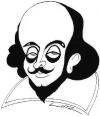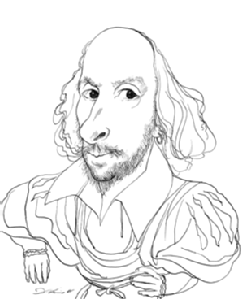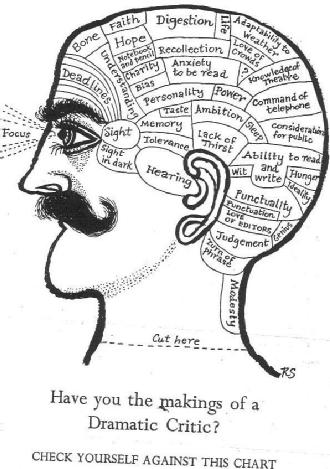Syllabus, Assessment, Trips 06-07
EN337: Shakespeare from Page to Stage to Page, 2006-07
Dr Paul Prescott
H514

AIMS
This module provides Theatre Studies and English students with an opportunity to explore, in depth, the translation of Shakespeare’s texts into performance and the various ways of receiving and analysing those performances. It will combine theatre history and semiotics with textual analysis, and will invite students to translate theory into practice, whether as critics, performers, directors or adaptors of Shakespeare. Six theatre trips to the RSC Complete Works season will be complemented by a range of ad hoc workshops with theatre professionals (actors, designers, directors, critics). An emphasis will be placed on re-viewing performance (whether two performances of one production – The Winter’s Tale – or two contrasting versions of Richard III) in order to grasp the volatility and openness of the theatrical event.

ASSESSMENT
Assessed Essay (40%)
Deadline: 22 January 2007 (Week 3)
3,000 words
Titles:
-
Write an analysis of one or two adaptations of a Shakespeare play. You should consider some of the following factors: its relationship to the original; the social and theatrical context of the adaptation; its tone, language, structure and dramatic effect; the reception and performance history of the adaptation.
-
Write an analysis of one or two live performances of a Shakespeare play seen during the course of the module (i.e. one or two from Julius Caesar, The Tempest and The Winter’s Tale).
Portfolio (60%)
Deadline for 1st Draft of Performance Text: 15 January (Week 2)
Deadline for complete Portfolio: 8 May 2007
Contents:
Group Performance Text (25% of overall mark)
Individual Contribution to Performance (10%)
Three Performance Reviews (15%)
Personal Reflection (10%)
Group Performance Text:
An adaptation of a Shakespearean original designed for performance. Both the source play and the nature of the adaptation will emerge from a series of Group Meetings.
The final product will show consideration of a number of key issues in Shakespearean performance, including: casting and doubling; cutting and adaptation; set design and costume; rehearsal techniques; theatre space; potential audiences; ‘paratexts’ (programmes, pre-publicity); authenticity and infidelity; archaisms; punctuation; politics.
Agreed Minutes from all Group Meetings detailing interpretive and creative discussions and decisions will form an Appendix to the text.
Individual Contribution to Performance:
This will be your own specialist contribution to the proposed theatrical event. This contribution might involve: costume sketches/research; programme writing and compilation; scene or passage work-shopping (as actor, director or dramaturge); stage history background of the adapted text; set design sketches/research; and so on.
Equally, you might write a piece analysing, justifying and/or critiquing your adaptation.
Three Performance Reviews (3 x 750 words):
These should be written as if for publication in a national newspaper.
Personal Reflection (1-2,000 words):
How have this module and the process of adapting the play changed your attitude to: Shakespeare; adaptation; reviewing; collaboration; theatre; studying and learning?

THEATRE TRIPS AND ACTIVITIES
Autumn Term
Week 2
Tue 10 Oct eve: Julius Caesar
Wed 11 Oct eve: The Tempest
Fri 13 Oct, 10-5pm: The Tempest Confluence, Courtyard Theatre
Week 6
Fri 10 Nov eve: The Winter’s Tale
Week 8
Tue 21 Nov eve: The Winter’s Tale
Spring Term
Week 2
Tue 16 Jan eve: Richard III
? Week 5 ?
Wed 7 Feb eve: Cymbeline (Birmingham Rep)
Week 6
Wed 14 Feb eve: The Baghdad Richard
Week 8
Wed 28 Feb eve: Coriolanus
A note on finances: our intention is to keep the cost of our theatre trips as low as possible, probably £5 per trip (ticket and transport). To help us keep costs down, it would be really helpful if anyone with a car would be willing to drive to Stratford and back. Or, if you’re over 21 and prepared to drive a minibus, we could travel en masse. I have made a point of not requiring you to buy any texts that you would not otherwise need for other modules. Please think of the £30 or so you’ll spend on theatre over the year as an equivalent outlay.

SYLLABUS AND ASSIGNMENTS
Autumn Term
Week 1
Seminar: Introduction to module and to each other.
Assignment: Short piece on your chosen newspaper reviewer
Week 2
Seminar: Post-show discussion of Julius Caesar with Steve Marmion, RSC Assistant Director of both Caesar and The Tempest.
Assignment: re-read The Tempest and write short piece on what you see as its main staging issues; Formulate three questions to ask Steve Marmion about Caesar.
Week 3
Seminar: Reviewing (Caesar and Tempest) with Dr Duska Radosavljevic; introduction to Shakespearean dramaturgy.
Assignment: Write 1000 word review of Julius Caesar, incorporating your summer preparation on the play. Send by email to your peer group; hard copy to PP.
Week 4
Seminar: Adapting Shax for Performance 1. Discussion of Hamlet Collage.
Assignments: re-read Hamlet. Read The Marowitz Shakespeare, pp.7-69 (Introduction and Hamlet Collage). Photocopies will be provided.
Week 5
Seminar: Shakespeare as Total Theatre – workshop with Dr Duska Radosavljevic
Assignment: First group discussion on Adaptation.
Week 6
NO SEMINAR
Assignment: re-read The Winter’s Tale. Bullet points on staging challenges (email to PP).
Week 7
Seminar: Reviewing Shakespeare workshop with Paul Allen (Capital Centre Fellow in Creativity and presenter of BBC Radio 3’s Night Waves)
Assignment (due Mon 13 Nov): email 1000-word review of The Winter’s Tale to group, Paul Allen and PP.
Week 8
Seminar: Adapting Shax for Performance 2. Discussion of Müller’s Hamlet.
Assignment: read The Hamletmachine, Heiner Müller. (PDF version will be provided). Research: performance history of The Hamletmachine.
Week 9
Seminar: Designing Shakespeare. Workshop with RSC designer (tbc).
Assignment: read introduction Looking at Shakespeare, Dennis Kennedy.
Week 10
Seminar: tba
Assignment: tba

Illustrative Bibliography
PRIMARY
Stephen Greenblatt et al, eds. The Norton Shakespeare.
Edward Braun. The Director and the Stage. London, 1982.
Declan Donnellan. The Actor and the Target. London, 2002.
Aristotle (tr. Kenneth Mcleash), Poetics. London, 1999.
Aston and Savona, Theatre as Sign System. London, 1991.
Maria Delgado and Paul Heritage, eds., In Contact with Gods? - Directors Talk Theatre. Manchester, 1996.
SECONDARY
David Bradby and David Williams. Directors’ Theatre. Basingstoke, 1988.
Colin Counsell. Signs of Performance: An Introduction to Twentieth Century Theatre. London, 1996.
Alison Hodge. Twentieth-Century Actor Training. London, 2000.
David Wiles. A Short History of Western Performance Space. Cambridge, 2003.
Susan Bennett. Theatre Audiences. London, 1997.
Julie Hankey, Shakespeare in Performance: Richard III. Manchester, 1988.
Stanley Wells, ed. Shakespeare in the Theatre. Oxford, 1997.
Rebecca Schneider and Gabrielle Cody, eds. Re:Direction, A theoretical and practical guide. London, 2002.
Ric Knowles, Reading the Materialist Theatre. Cambridge, 2004.
Dennis Kennedy, Looking at Shakespeare. Cambridge, 2003.
Stanley Wells and Sarah Stanton (eds), The Cambridge Companion to Shakespeare on Stage. Cambridge, 2002.
Jonathan Bate and Russell Jackson (eds), The Oxford Illustrated History of Shakespeare on Stage. Oxford, 1996.
Gary Taylor, Moment by Moment by Shakespeare. London, 1985.
Gary Taylor, Reinventing Shakespeare: a cultural history from the Restoration to the present. London, 1990.
Martin Buzzacott, The Death of the Actor: Shakespeare on Page and Stage. London, 1991.
Harry Berger Jr, Imaginary Audition: Shakespeare on Stage and Page. London, 1989.
Richard Drain, Twentieth-Century Theatre: A Sourcebook. London, 1995.
Richard Nelson and David Jones, Making Plays: the writer-director relationship in theatre today. London, 1995.
